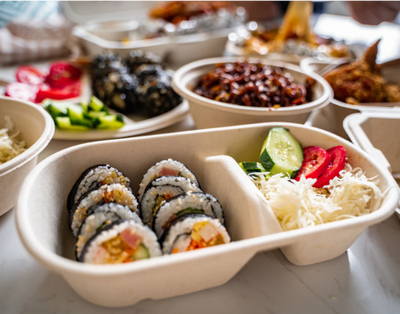The shift in the food service and hospitality (FnB) sector is no longer a trend; it's a structural transformation. For restaurants, cafes, and catering businesses, the question is not if they should adopt sustainable food packaging, but how fast they can do so. The drivers are undeniable: escalating global plastic bans, demanding consumer values, and the simple reality that plastic waste has become a massive reputational and operational liability.
Future-proofing your restaurant means looking beyond the immediate cost of a single-use container and calculating the long-term value of a truly plastic free business model. This is the roadmap for how the FnB industry can not only adapt to this new normal but thrive within it.
Pillar 1: Regulatory Compliance and Risk Mitigation
The first and most urgent reason to adopt sustainable food packaging is the law. Across North America, Europe, and Asia, municipalities are implementing increasingly strict bans on single-use plastics—not just straws, but also cutlery, foam containers, and plastic bags.
-
Avoid Fines and Bans: Businesses caught non-compliant face heavy fines and potential operational shutdowns. Relying on traditional plastic is a significant, unnecessary business risk.
-
Embrace the Guaranteed Solution: Certified compostable solutions offer the only clear regulatory pathway forward for disposables. Products like EQUO’s sugarcane containers and coffee ground utensils are designed to meet stringent global compostability standards, guaranteeing compliance and eliminating risk. This is the ultimate insurance policy against the next wave of plastic bans.
Pillar 2: The Loyalty-Driving Power of Conscious Consumers
Today’s consumer—especially Millennials and Gen Z—actively seek out and spend more money with brands that align with their environmental values. Sustainability is now a core part of the dining experience.
-
Premium Brand Image: Switching to high-quality, plant-based packaging elevates your brand from a low-cost operation to a thoughtful, premium experience. When a customer sees a unique, durable fork made from coffee grounds (like those offered by EQUO), they don't just see a utensil; they see a brand statement that justifies their loyalty.
-
The Power of the Photo: In the age of social media, your packaging is your marketing. A beautiful, plastic free business model encourages customers to share their sustainable experience, providing free, high-value marketing. No one posts a photo of a flimsy white plastic fork.

Pillar 3: Operational Efficiency and the Circular Economy
The notion that sustainable packaging is inherently more expensive is quickly becoming outdated, especially when factoring in the total cost of ownership.
-
Waste Management Savings: In areas with strong commercial composting infrastructure, diverting disposables from the landfill can reduce garbage collection costs. You are trading expensive landfill tipping fees for more efficient organic recycling.
-
Utilizing Waste Streams: The most innovative sustainable food packaging solutions utilize existing waste—a core principle of the circular economy. EQUO's products, made from agricultural byproducts like sugarcane pulp and spent coffee grounds, demonstrate this. You are not extracting new resources; you are upcycling waste. This offers a more stable, less volatile supply chain than one dependent on global fossil fuel markets.
The Roadmap to a Plastic-Free Restaurant: Actionable Steps
Becoming a plastic free business doesn't happen overnight. Here are the three most critical steps for the FnB sector:
-
Audit and Eliminate: Identify the "Big Four" plastic culprits: straws, cutlery, bags, and foam containers. Replace them immediately with certified compostable or reusable alternatives. This is the low-hanging fruit.
-
Educate Your Staff and Customers: Train your team to know the difference between biodegradable and compostable. Clearly label your disposal bins (Compost, Recycle, Landfill) and educate customers via signage. This ensures your sustainable food packaging ends up in the right place, closing the loop.
-
Partner with Expert Suppliers: Do not settle for "eco-friendly" claims without third-party certification. Partner with specialized providers like EQUO who focus solely on certified, high-performance, plant-based alternatives. This protects your brand and ensures the sustainability claims are genuine.

By making these strategic shifts, restaurants are not just following regulations; they are leading the industry toward a cleaner, more resilient, and more profitable future. The choice of sustainable food packaging is the most powerful investment a modern restaurant can make.






